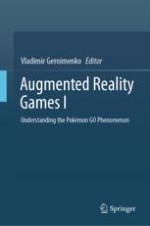2019 | OriginalPaper | Chapter
7. Player Experiences in Location-Based Games: Memorable Moments with Pokémon GO
Authors : Elina Koskinen, Dale Leorke, Kati Alha, Janne Paavilainen
Published in: Augmented Reality Games I
Publisher: Springer International Publishing
Activate our intelligent search to find suitable subject content or patents.
Select sections of text to find matching patents with Artificial Intelligence. powered by
Select sections of text to find additional relevant content using AI-assisted search. powered by
